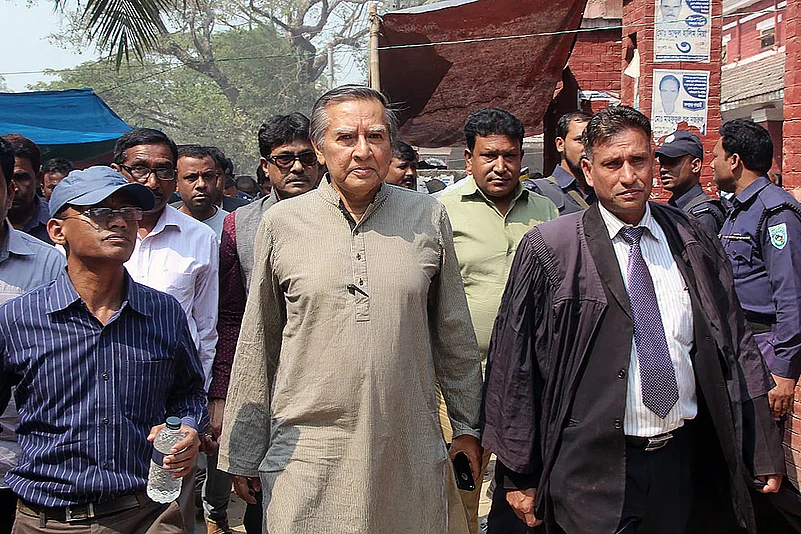Bangladesh’s Awami League government of Sheikh Hasina seems to be following Narendra Modi’s example of silencing dissenters. However, at the receiving end of Dhaka’s ruling party’s ire are not ‘anti-national’ students, but Mahfuz Anam, one of the country’s most celebrated journalists and editor of the Daily Star.
The newspaper is not only the most-read English daily of Bangladesh, but has also been a window to developments within the country for people who do not read Bengali.
Of the 79 cases that Mahfuz is charged with, 17 are for ‘sedition’, while the rest are for defamation, filed in 60 different places, and adding up to damages of a ridiculous 13.2 trillion takas (or over $100 billion).
The criticism against the Daily Star editor is that in 2007 he published stories planted by an army-backed caretaker government against Hasina and the Bangladesh Nationalist Party leader Begum Khaleda Zia without the required ‘verification’. The reports of corruption that were carried in the press, it is alleged, helped pave the way for the subsequent arrest of the two leaders.
“It seems like an undeclared Emergency,” says veteran Indian journalist Kuldip Nayar, who himself had been tormented by Indira Gandhi's regime. “Mahfuz is an honest and fearless journalist who is being harassed by the Hasina government for his independent views,” he added.
Trouble began for the editor unexpectedly. On February 3, Mahfuz was at a TV talk show in the run-up to his newspaper’s 25th anniversary. Responding to a question on his career, he responded by saying that there was a "lapse of editorial judgment" on his part when he ran stories supplied by investigators of the army-backed caretaker government during 2007 without independently ‘verifying’ them. Mahfuz’s comments went viral in social media, became a favourite topic in the press and TV shows and was inflated to enormous proportions.
Though prime minister Hasina or her government have not brought any charges against Mahfuz so far, her decision to criticise the Daily Star and its sister publication, the Bengali daily Prothom Alo, in public and in parliament has encouraged her supporters to file cases against Mahfuz in different courts all over Bangladesh. Many see this as an attempt on Hasina’s part to put pressure on him by proxy. By making an example of Mahfuz, say observers, she may be trying to give out a clear signal to other dissenters.
Opinion in Bangladesh is divided over the role Mahfuz Anam played against the Awami League and BNP leaders in 2007. His detractors argue he was a willing party to the move; others see him as a victim. But in the rising din, it is forgotten that not only several other newspapers and TV channels in Bangladesh had carried similar reports against the two leaders, but that Mahfuz had written several editorials criticising their arrest. Besides, his paper had also been consistent in its demand for the restoration of the democratic process and the holding of parliamentary elections.
What interests observers is the timing of the move by Hasina against Mahfuz. The editor has been a strong supporter of many of Hasina’s policies, including her controversial action against 1971 war criminals and move to build strong ties with India. So what makes the PM train her guns on him now?
Mahfuz’s closeness to Nobel laureate Mohammed Yunus could be an added factor in Hasina’s ire. Yunus was floated as a possible candidate to head a government backed by the army in 2007 and this is the time from when Hasina started regarding him as a bitter rival. Soon after, Yunus had faced myriad charges, from corruption to faulty policies, and was removed as MD of Grameen Bank. Her criticism of Yunus even found its way when Hillary Clinton visited Dhaka as US Secretary of State some years back. The fact that Hillary is a personal friend of Yunus and the possibility of her becoming the first woman president of the US could have added to the nervousness in the Hasina camp.
But for a country where space for dissent is fast shrinking, the attack on the Daily Star editor only adds to the rising worries of the beleaguered forces of liberalism.

























